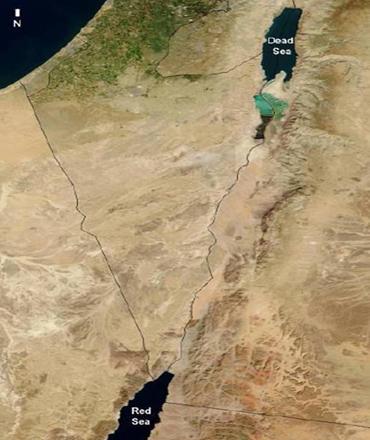You are here
Jordan to go ahead with Red-Dead project ‘regardless of Israeli position’
By Hana Namrouqa - Feb 12,2018 - Last updated at Feb 12,2018
AMMAN — Jordan is committed to implementing the Red Sea-Dead Sea Water Conveyance Project despite repeated Israeli signals that it was withdrawing from the regional scheme, a source said on Sunday.
"It is clear that Israel is no longer interested in the Red-Dead Project given repeated news reports casting doubt on its necessity, feasibility and agenda," the source, who spoke on the condition of anonymity, told The Jordan Times.
The official warned that Israel's frequently suggested withdrawal from the project and deliberate creation of stumbling blocks to hold the project back can "only hurt regional stability".
"We are ready to press ahead with the project, but Israel has been repeatedly hindering it for some time, now and this is disrupting regional cooperation and undermining the slightest chances for peace in the Middle East," the source noted.
A recent opinion article in The Jerusalem Post suggested that the project had a partisan political agenda, questioning Israel's need for the project.
In the article, the writer said that since Israel had already built several desalination plants, and an additional one in Jordan was "unnecessary", stressing that, if Jordan wanted its own desalination plant, Israel "should not have to pay for it".
In November last year, Israeli media reports claimed that Israel had told Jordan that a joint agreement for the construction of a pipeline transferring water from the Red Sea to the Dead Sea would not go ahead until Israel is allowed to reopen its embassy in Amman.
A senior government source contacted by The Jordan Times, however, said that Jordan would go ahead with the Red-Dead project “with or without Israel”.
Jordan signed a memorandum of understanding (MoU) with Israel and Palestine in December 2013 to implement the first phase of the Red-Dead project. Under the first phase, a total of 300 million cubic metres (mcm) of water would be pumped each year. Eventually, up to 2 billion cubic metres of seawater will be transferred from the Red Sea to the Dead Sea annually, according to the Ministry of Water and Irrigation.
A total of 85-100mcm of water will be desalinated every year, while the seawater will be pumped out from an intake located in the north of the Gulf of Aqaba.
In addition, a conveyor will be extended to transfer desalinated water and a pipeline will be installed to dump the brine into the Dead Sea in order to stop its constant decline, estimated at one metre every year.
The Kingdom will receive an additional 50mcm of water from the Lake Tiberias Reservoir annually to be added to its share from the desalination station to provide Aqaba with water, according to the ministry.
The Red-Dead project’s main components will include a seawater intake structure; an intake pump station; a seawater pipeline; a desalination plant with a capacity of 65-85mcm per year; a desalination brine conveyance pipeline; two lifting pump stations; hydropower plants; and discharge facilities at the Dead Sea.
Under the signed MoU, Palestine will receive 30mcm of freshwater to cover its water deficit, while Israel will buy its share of 50mcm of desalinated water from the project at cost value, and sell Jordan the same amount of water in the northern Jordan Valley at a cost of JD0.27 per cubic metre.
Related Articles
AMMAN — The Water Ministry on Sunday signed the engineering services agreement for the first phase of the Red Sea-Dead Sea Water Conveyance
AMMAN — The Ministry of Water and Irrigation has modified the final submission date of the prequalification proposals for the first phase of
AMMAN — The winning bid to implement the first phase of the Red Sea-Dead Sea Water Conveyance Project (Red-Dead) will be announced in early














